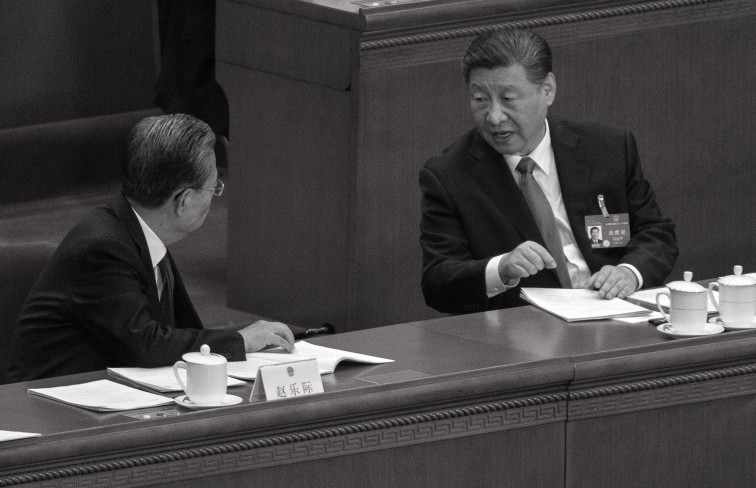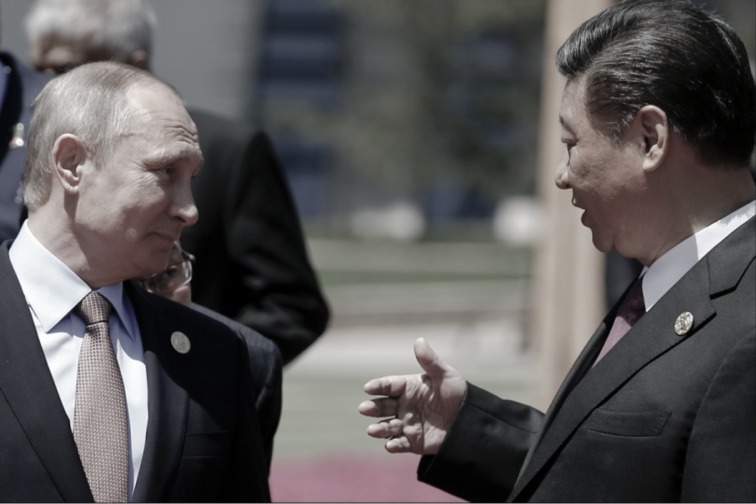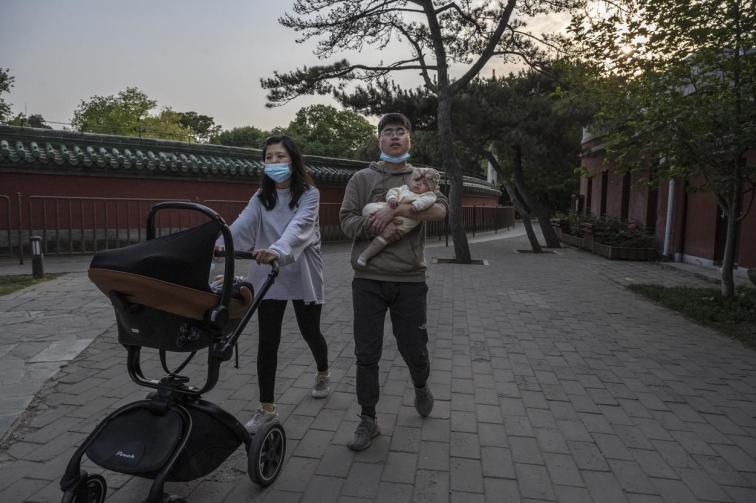This blogger asked in an empty shopping mall: In a city of 30 million people, where did everyone go? (Video screenshot)
[People News] As the economic leader of the CCP, the international metropolis of Shanghai is losing its aura of prosperity as the economy declines. Foreigners living in Shanghai are moving out one after another. From the desolate streets and alleys to empty roads and shopping malls, this metropolis, once called the “Magic City” and representing China’s vitality, is now facing unprecedented challenges. More and more citizens feel economic pressure. Like other cities, Shanghai is beginning to show signs of depression, and the bustling scenes of the past are hard to see again.
The Whole Country Is Crying
Economist Wang Depei recently said in a speech circulating online, “The era of China’s streets is over.” He said Shanghai, the largest city in the country, has Nanjing Road, one of the most luxurious streets. Recently, many distinctive shops and well-known brand stores on Nanjing Road have been closing one after another. This not only reflects the economic downturn but also the inevitable result of changes in consumption methods and adjustments to business models. Consumption has shifted from offline to online, and large shopping complexes are being built more and more, making the decline of traditional street economies almost unavoidable. “It would be strange if Nanjing Road didn’t die.”
Some videos shot by Shanghai netizens reflect the city’s decline.
A female blogger said on camera, “Right now, the whole country is crying. The vegetable sellers are crying, the meat sellers are crying, the restaurant owners are crying, the Didi drivers are crying, the food delivery guys are crying, the real estate agents are crying, the migrant workers are crying, the clothing shop owners are crying… I just want to ask you all: which industry is still laughing?”
A Shanghai blogger filmed in an empty shopping mall and said, “Such a big mall, and apart from the shopkeepers, there are almost no customers. In a city of 30 million people, where did they all go? It feels like this mall has been contracted just for you and me.”
A Shanghai shop owner said, “How hard is it to do business now? I start work at 8:30 in the morning until 9:30 at night, and today’s turnover was 850 yuan, minus (costs) 960, if you don’t count labour, then about a 100 yuan loss. And today, from morning till night, only 350 yuan came in. If you don’t open, you feel unwilling; if you open, you feel like dying.”
A blogger said, “September is the coldest winter for industries; everyone is the same. How bad is it now: in the foreign trade market, goods are piled into mountains and can’t be sold; restaurant turnover rates have been cut in half, the shops are deserted; real estate, renovation, and education are all crying they have no customers. In September and October, there are countless cases of subletting and lease cancellations. Why? First, school starts, and half the consumer group is directly affected; second, with the economic downturn, people don’t dare to spend recklessly anymore, and their wallets are thinner. It’s not that you’re bad at business, it’s the whole environment.”
Another blogger said, “In the past, we used to kneel to beg banks for help. Now it’s the other way around. A bank friend said banks have so much money they can’t lend it out. Loan interest rates keep dropping; they try all kinds of tricks to attract customers, but still no one wants loans. Now even bank presidents have to personally go out to chase business.”
Popularity was Directly Weakened by 99%
Blogger “Lao Wang” shared a video on Sept. 23 in which several Shanghai citizens appeared to share what they saw. The video shows people lying in a row, sleeping on the floor inside an empty mall. Another clip shot on West Nanjing Road shows people sleeping rough on the streets.
At Yuyuan Chenghuang Temple, one of Shanghai’s most iconic tourist landmarks, the crowds have also thinned dramatically. Mr Song, a local citizen who visited in person, said that today’s foot traffic is about two-thirds less than the same period in 2019: “The scenes of people squeezed shoulder-to-shoulder are gone. Even during lunch peak, almost no customers enter the shops.” Where there are crowds, few are spending, with most just checking in and taking photos.
Another citizen said that two years ago, on Changle Road in Shanghai, many people ate and drank beer outside the shops. Now at the same spot, no one is there — “popularity has been directly weakened by 99%. Now there’s nothing left.”
A citizen said that many industries in Shanghai are in trouble. Money is hard to make. When nobody is making money, consumption naturally falls. With bosses unable to earn, street shops close down in droves. Even in the city centre’s prime business districts, consumer collapse is clear to see. The worst is: on a street once lively, not a single person can be seen. All the shops are cold and empty. Even where there are people, careful observation shows 80% to 90% are just window-shopping without spending. Shanghai’s train station during peak hours is also empty.
Another citizen said Shanghai’s restaurant industry is in the same situation as the rest of the country. Even a 5-year-old established Shanghai cuisine restaurant couldn’t survive. Once-popular internet-famous restaurants now have “Prime Location for Transfer” signs stuck to their windows.
One Shanghai citizen sadly said that now he cannot sleep at night, and walking on the street in the daytime feels like being soulless. His monthly salary is only a few thousand yuan, but his mortgage is astronomical. He feels his life is over.
Another Shanghai citizen said he really feels the pressure of the economic downturn. Ordinary people work hard for a month but earn little. They worry about paying mortgages and car loans and face layoffs. Now they truly experience what it feels like not getting paid or not having food to eat.
Beyond retail and dining, even Shanghai’s state-owned enterprises are showing stress signals.
Recently, multiple self-media accounts and online forums revealed that Shanghai Shentong Metro Group suddenly launched a so-called “personnel structure optimisation plan,” with the first batch involving about 2,000 employees, mainly targeting those over 50. Although this news hasn’t been confirmed by Shentong Metro or any official announcement, online discussions continue.
Shanghai Construction Group is also faltering. According to multiple bloggers, the company plans large layoffs before the end of the year, cutting from the current 14,000 employees to fewer than 8,000. Reportedly, layoffs are happening in batches — some employees are cut as soon as a project ends, others are sent home on standby and given only the minimum salary of 2,690 yuan per month. Online, some employees have already shared their termination notices. These reports, however, have not been officially confirmed.
Since the COVID-19 pandemic, passenger flow at Shanghai Pudong Airport has dropped sharply, and the airport’s emptiness has been repeatedly exposed. Recently, bloggers on social media claimed Pudong Airport is facing massive losses and plans to lay off 8,000 employees. Although this has not been officially announced, public attention is high. One netizen sighed: “If even the airport is doing large-scale layoffs, then other industries are even less optimistic. But this will be the new normal in the future.”

The once-busiest underground malls in Shanghai are now cold and deserted. (Video screenshot)
Deceived by Fake Data, Property Lost
Chinese people who understand the CCP’s history of fraud know that in the CCP mouthpiece media, apart from the date, almost everything else could be fake. Many citizens clearly see China’s economy worsening and living standards declining, but that does not ease their economic burden. Yet the authorities release data that mislead them into thinking the economy will quickly recover, leading to blind investments. Many middle-class people have lost their property because they trusted the CCP’s lies.
Recently, blogger “Shanghai Man” said he counts himself as middle class in Shanghai, but he has fallen to the brink of bankruptcy. One reason is that he trusted official data and the state media’s misleading reports. First, before the pandemic, he bought a house with nearly 2 million yuan in loans, paying about 10,000 yuan a month in mortgage.
He pointed out two reasons. First, before the pandemic, he bought a house with nearly 2 million yuan in loans, paying about 10,000 yuan a month. When the pandemic first began, he was misled by positive reports and opened a restaurant. In 2022, during the harsh lockdowns, he panicked and borrowed from small loan companies or online lending platforms.
“Shanghai Man” said that after lockdowns ended in 2023, he was again misled by media reports and official data into believing the economy would rebound strongly, which made him blindly optimistic and start revenge spending. “That was my biggest mistake. Everyone can see what the economy is really like.”
He said that now he has nothing left and is deep in debt. He believes that in the current environment of economic decline in China, no one can escape unscathed. In real life, unemployment, wage cuts, and bankruptcies are everywhere. △











News magazine bootstrap themes!
I like this themes, fast loading and look profesional
Thank you Carlos!
You're welcome!
Please support me with give positive rating!
Yes Sure!